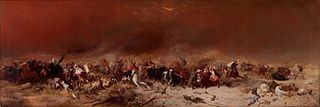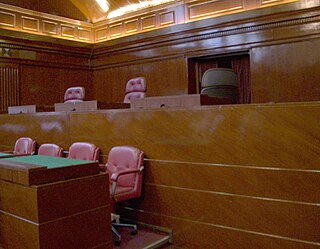A summary offence is a crime in some common law jurisdictions that can be proceeded against summarily, without the right to a jury trial and/or indictment.
Defamation is the oral or written communication of a false statement about another that unjustly harms their reputation and usually constitutes a tort or crime. In several countries, including South Korea, a true statement can also be considered defamation.
Obstruction of justice, in United States jurisdictions, is a crime consisting of obstructing prosecutors, investigators, or other government officials. Common law jurisdictions other than the United States tend to use the wider offense of perverting the course of justice.

Jacob Gedleyihlekisa Zuma is a South African politician who served as the fourth democratically elected President of South Africa from 2009 to 2018. Zuma is also referred to by his initials JZ and his clan name Msholozi.

The Constitutional Court of South Africa is a supreme constitutional court established by the Constitution of South Africa, and is the apex court in the South African judicial system, with general jurisdiction.
In law, sub judice, Latin for "under a judge", means that a particular case or matter is under trial or being considered by a judge or court. The term may be used synonymously with "the present case" or "the case at bar" by some lawyers.
Brady v. Maryland, 373 U.S. 83 (1963), was a landmark United States Supreme Court case that established that the prosecution must turn over all evidence that might exonerate the defendant to the defense. The prosecution failed to do so for Brady, and he was convicted. Brady challenged his conviction, arguing it had been contrary to the Due Process Clause of the Fourteenth Amendment to the United States Constitution.

The Special Court for Sierra Leone, or the "Special Court" (SCSL), also called the Sierra Leone Tribunal, was a judicial body set up by the government of Sierra Leone and the United Nations to "prosecute persons who bear the greatest responsibility for serious violations of international humanitarian law and Sierra Leonean law" committed in Sierra Leone after 30 November 1996 and during the Sierra Leone Civil War. The court's working language was English. The court listed offices in Freetown, The Hague, and New York City.

Joseph Michael Arpaio is an American former law enforcement officer and politician. He served as the 36th Sheriff of Maricopa County, Arizona for 24 years, from 1993 to 2017, losing reelection to Democrat Paul Penzone in 2016.
United States v. Shipp, 203 U.S. 563 (1906), was a ruling of the Supreme Court of the United States with regard to a lynching in Chattanooga, Tennessee. As of 2021, it remains the only Supreme Court criminal trial in history.
The Constitution of India provides the right of freedom, given in article 19 with the view of guaranteeing individual rights that were considered vital by the framers of the constitution. The right to freedom in Article 19 guarantees the freedom of speech and expression, as one of its six freedoms.
Street v. New York, 394 U.S. 576 (1969), was a United States Supreme Court case in which the Court held that a New York state law making it a crime "publicly [to] mutilate, deface, defile, or defy, trample upon, or cast contempt upon either by words or act [any flag of the United States]" was, in part, unconstitutional because it prohibited speech against the flag. The Court left for a later day the question of whether it is constitutional or unconstitutional to prohibit, without reference to the utterance of words, the burning of the flag.

The Constitutional history of Australia is the history of Australia's foundational legal principles. Australia's legal origins as a nation state began in the colonial era, with its legal system reliant initially upon a legal fiction of terra nullius to impose British law upon the colony of New South Wales. As the colonies expanded, Australia gradually began to achieve de facto independence. Over the years as a result the foundations of the Australian legal system gradually began to shift. This culminated in the Australia Act, an act formally ending legal ties with the UK.

In Singapore, the offence of scandalizing the court is committed when a person performs any act or publishes any writing that is calculated to bring a court or a judge of the court into contempt, or to lower his authority. An act or statement that alleges bias, lack of impartiality, impropriety or any wrongdoing concerning a judge in the exercise of his judicial function falls within the offence. The High Court and the Court of Appeal are empowered by section 7(1) of the Supreme Court of Judicature Act to punish for contempt of court. This provision is statutory recognition of the superior courts' inherent jurisdiction to uphold the proper administration of justice. The Subordinate Courts are also empowered by statute to punish acts of contempt. Although Article 14(1)(a) of the Constitution of the Republic of Singapore protects every citizen's right to freedom of speech and expression, the High Court has held that the offence of scandalizing the court falls within the category of exceptions from the right to free speech expressly stipulated in Article 14(2)(a). Some commentators have expressed the view that the courts have placed excessive value on protecting the independence of the judiciary, and have given insufficient weight to free speech.

Shadrake Alan v. Attorney-General is a 2011 judgment of the Court of Appeal of Singapore that clarified the law relating to the offence of scandalizing the court. Alan Shadrake, the author of the book Once a Jolly Hangman: Singapore Justice in the Dock (2010), was charged with contempt of court by way of scandalizing the court. The Prosecution alleged that certain passages in his book asserted that the Singapore judiciary lacks independence, succumbs to political and economic pressure, and takes a person's position in society into account when sentencing; and that it is the method by which Singapore's ruling party, the People's Action Party, stifles political dissent in Singapore.

The Smith Act trials of Communist Party leaders in New York City from 1949 to 1958 were the result of US federal government prosecutions in the postwar period and during the Cold War between the Soviet Union and the United States. Leaders of the Communist Party of the United States (CPUSA) were accused of violating the Smith Act, a statute that prohibited advocating violent overthrow of the government. The defendants argued that they advocated a peaceful transition to socialism, and that the First Amendment's guarantee of freedom of speech and of association protected their membership in a political party. Appeals from these trials reached the US Supreme Court, which ruled on issues in Dennis v. United States (1951) and Yates v. United States (1957).
South Africa is a secular state, with freedom of religion enshrined in the Constitution.
Mbuyiseli "Russell" Madlanga is a judge of the Constitutional Court of South Africa, having been appointed on 1 August 2013.
Jacob Boy Mamabolo is a South African politician from Limpopo who serves as a Member of the National Assembly of South Africa. He was elected to Parliament at the 2019 general election. Mamabolo is a member of the African National Congress.








